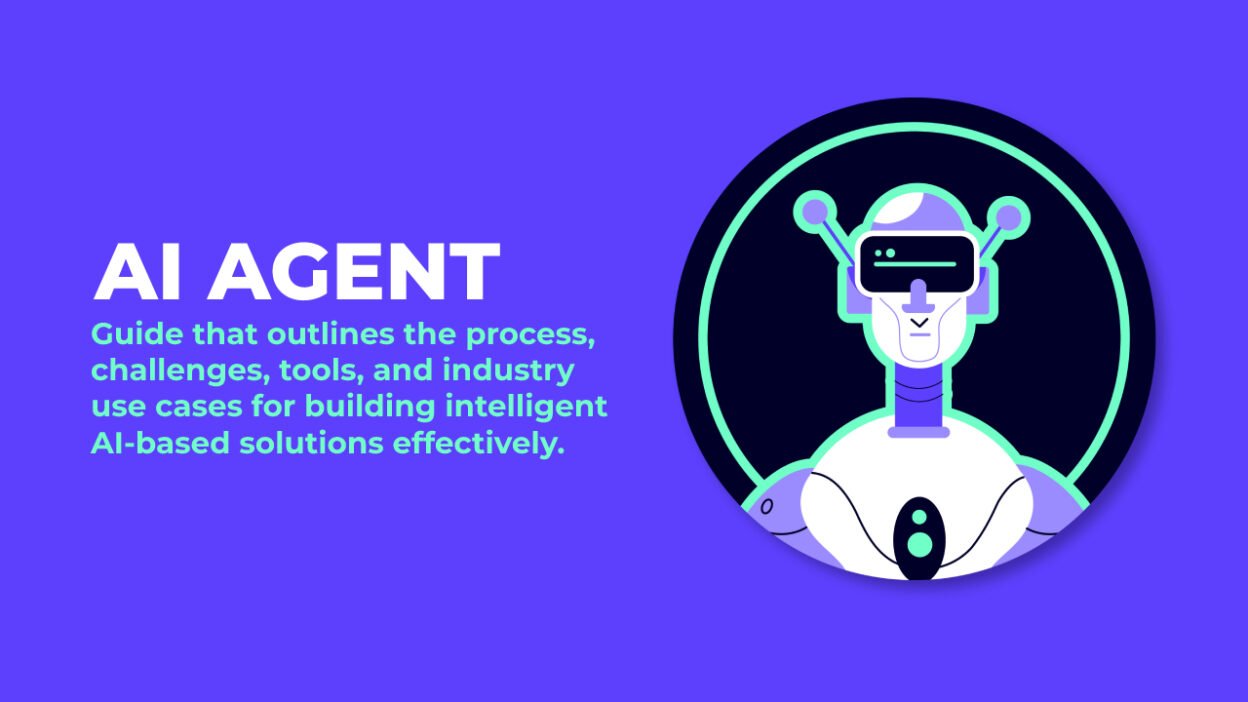In the rapidly evolving digital landscape, businesses are constantly seeking ways to optimize their operations and improve efficiency. One of the most transformative technologies enabling this change is Artificial Intelligence (AI). Among AI innovations, AI agents stand out as highly effective tools that can perform complex tasks, analyze vast datasets, and automate workflows. Partnering with a reliable AI agent development company can significantly boost business productivity, streamline processes, and enhance decision-making.
What is an AI Agent?
An AI agent is a software program designed to autonomously perform tasks by learning from data, interacting with its environment, and making informed decisions. These agents can range from virtual assistants and customer support bots to advanced AI systems that manage business processes. Unlike traditional automation, AI agents can adapt, learn, and improve over time, making them highly efficient and versatile.
AI agents typically operate in three main areas:
Reactive Agents: Respond immediately to specific inputs or situations.
Deliberative Agents: Analyze data, predict outcomes, and make decisions based on reasoning.
Learning Agents: Continuously improve their performance through experience and feedback.
These capabilities make AI agents indispensable for businesses aiming to boost productivity and gain a competitive edge.
Benefits of AI Agent Development for Businesses
Partnering with a dedicated AI agent development company offers numerous benefits that directly contribute to improved productivity:
- Automating Repetitive Tasks
AI agents excel at handling routine, repetitive tasks, such as data entry, report generation, and email management. By automating these functions, businesses can free up employees to focus on higher-value tasks, reducing operational bottlenecks and increasing overall efficiency.
- Enhancing Customer Support
AI agents can operate as virtual customer support representatives, handling inquiries, resolving issues, and providing 24/7 assistance. This leads to faster response times, improved customer satisfaction, and reduced workload for human support teams.
- Data-Driven Decision Making
AI agents analyze vast amounts of structured and unstructured data to generate actionable insights. From predicting market trends to optimizing supply chains, these insights help business leaders make informed decisions faster, reducing risks and improving strategic outcomes.
- Personalized Customer Experiences
By leveraging AI agent capabilities, companies can deliver personalized recommendations, offers, and solutions to customers. Personalization enhances engagement, drives loyalty, and ultimately contributes to higher revenue and productivity.
- Scalability and Flexibility
AI agents can scale according to business needs without compromising performance. Whether it’s handling thousands of customer queries or managing complex operational tasks, AI agents provide the flexibility needed to adapt to changing business environments.
- Cost Reduction
Automation powered by AI agents reduces labor costs, minimizes errors, and increases operational efficiency. While the initial investment in AI agent development may be significant, the long-term savings and productivity gains make it a cost-effective solution.
Key Services Offered by AI Agent Development Companies
A professional AI agent development company provides end-to-end services to help businesses implement intelligent solutions. Some of the core services include:
Custom AI Agent Development: Tailored solutions that meet specific business needs and integrate seamlessly with existing systems.
Natural Language Processing (NLP) Agents: AI agents capable of understanding and processing human language, ideal for chatbots, virtual assistants, and customer service applications.
Machine Learning Agents: AI agents that can learn from data and improve performance over time, perfect for predictive analytics, fraud detection, and demand forecasting.
Robotic Process Automation (RPA): AI agents designed to automate repetitive business processes, increasing efficiency and accuracy.
Integration and Deployment: Ensuring AI agents are effectively integrated into workflows and deployed across platforms without disrupting operations.
Maintenance and Support: Ongoing updates, monitoring, and optimization to ensure AI agents continue to deliver maximum productivity benefits.
Industries Benefiting from AI Agent Development
AI agent technology is transforming multiple industries by automating processes, enhancing decision-making, and improving customer interactions. Some of the sectors experiencing significant productivity gains include:
Finance and Banking: AI agents help in fraud detection, transaction monitoring, loan approvals, and customer support.
E-commerce: Virtual assistants provide personalized recommendations, manage inventory, and optimize logistics.
Healthcare: AI agents assist in patient monitoring, appointment scheduling, and medical data analysis.
Manufacturing: AI agents streamline supply chain management, quality control, and predictive maintenance.
Education: Virtual teaching assistants and administrative AI agents help manage student queries, grading, and learning analytics.
How to Choose the Right AI Agent Development Company
Selecting the right AI agent development partner is crucial for maximizing productivity benefits. Consider the following factors:
Expertise and Experience: Look for companies with a proven track record in AI agent development across industries.
Customization Capabilities: The company should offer solutions tailored to your specific business requirements.
Integration Skills: Ensure they can seamlessly integrate AI agents with your existing systems and workflows.
Technology Stack: Check if the company uses advanced technologies such as NLP, machine learning, and RPA.
Support and Maintenance: Opt for companies that provide ongoing support, updates, and performance optimization.
Client References and Case Studies: Review past projects to understand the company’s ability to deliver measurable productivity improvements.
Real-World Examples of AI Agent Implementation
Several companies have successfully leveraged AI agent development to boost business productivity:
Amazon: Uses AI agents for warehouse automation, customer support, and personalized recommendations.
Bank of America: Deployed an AI virtual assistant, “Erica,” which helps millions of customers with banking tasks, reducing wait times and increasing efficiency.
Sephora: Uses AI chatbots to provide personalized beauty advice, enhancing customer experience and operational efficiency.
Siemens: Employs AI agents in manufacturing for predictive maintenance, reducing downtime and increasing production efficiency.
These examples demonstrate how AI agent development can transform business operations and deliver measurable productivity gains.
Future Trends in AI Agent Development
The future of AI agent development promises even greater productivity benefits:
Hyper-Personalized Agents: AI agents that understand individual employee and customer preferences to provide highly customized support.
Multi-Agent Collaboration: Multiple AI agents working together to handle complex tasks and provide cross-functional insights.
AI-Driven Decision Support Systems: Advanced AI agents that assist executives in strategic planning and real-time decision-making.
Enhanced Learning Capabilities: AI agents with improved learning algorithms that continuously optimize processes without human intervention.
Ethical and Transparent AI Agents: Development of AI agents that comply with ethical standards, privacy regulations, and transparent decision-making.
Future Innovations in AI Agents
The field of AI agent development is evolving rapidly, and businesses can expect a new generation of intelligent agents that go far beyond simple task automation. Emerging trends are transforming how AI agents contribute to productivity, decision-making, and strategic planning.
- AI Agents with Emotional Intelligence (EI)
Next-generation AI agents are being designed with emotional intelligence capabilities, allowing them to understand and respond to human emotions. By analyzing tone, sentiment, and context in communication, these agents can provide empathetic customer support, personalized employee interactions, and effective conflict resolution. For businesses, this translates into improved customer satisfaction, better team collaboration, and a more human-centered approach to automation. - Autonomous Project Management Agents
AI agents are increasingly being developed to handle complex project management tasks autonomously. These agents can schedule meetings, allocate resources, track milestones, predict delays, and even generate progress reports in real-time. By taking over repetitive and time-consuming project management activities, these AI agents free up human managers to focus on strategic decision-making, significantly improving operational efficiency. - AI-Driven Market Research Tools
The integration of AI agents into market research allows businesses to analyze vast amounts of data faster and more accurately. AI agents can track industry trends, monitor competitor activity, identify emerging opportunities, and even predict consumer behavior. This capability provides companies with actionable insights without the delays and costs associated with traditional research methods, enabling faster, more informed business decisions and a competitive edge in the marketplace. - Collaborative Multi-Agent Systems
Another trend is the development of collaborative multi-agent systems, where several AI agents work together to solve complex tasks. For example, one agent might analyze customer data while another generates predictive insights, and a third handles operational implementation. This collaborative approach enhances productivity, reduces errors, and allows businesses to handle large-scale operations more efficiently. - Continuous Learning and Adaptive AI Agents
Future AI agents will possess advanced learning algorithms that allow them to adapt dynamically to changing business conditions. These agents can update strategies, refine workflows, and optimize performance without human intervention. Such adaptive behavior ensures businesses remain agile, maintain high productivity, and stay ahead in fast-moving markets.
Impact on Business Productivity
The innovations in AI agent development promise exponential productivity gains. From enhancing customer engagement and automating complex projects to providing real-time strategic insights, these AI agents will enable organizations to operate more efficiently, reduce operational costs, and make better-informed decisions. Companies that adopt these advanced AI solutions early will be positioned as leaders in digital transformation and business innovation.
Cost vs. ROI of AI Agent Development
Investment Required for AI Agent Deployment
The cost of developing and deploying AI agents varies based on complexity, functionality, and industry requirements. Here’s a breakdown of typical expenses:
Development Costs: Basic rule-based agents may cost between $5,000 to $20,000, while more advanced AI agents utilizing machine learning can range from $30,000 to $100,000
Operational Costs: Monthly expenses for AI agent deployment can range from $3,200 to $13,000, covering areas such as large language model (LLM) API usage, retrieval infrastructure, monitoring, prompt tuning, and security measures
Ongoing Maintenance: Annual maintenance and updates can add approximately 17–30% of the initial development cost, with potential increases up to 50% in certain scenarios
SumatoSoft
📈 Expected Return on Investment (ROI)
Investing in AI agents can yield significant returns. Key statistics include:
High ROI Expectations: Approximately 62% of organizations anticipate a 100%+ ROI from deploying AI agents
Rapid ROI Realization: In the UK and EU, nearly two-thirds of B2B revenue leaders report achieving ROI within the first year of AI adoption, with 19% realizing ROI within three months and 27% within six to twelve months
📊 Real-World Case Studies
Several organizations have successfully implemented AI agents, demonstrating tangible ROI:
Customer Support Automation: A leading e-commerce company integrated AI agents to handle customer inquiries, resulting in an 80% reduction in support costs and a 90% faster response time
Sales Process Optimization: A global technology firm deployed AI agents to automate lead qualification, leading to a 35% faster lead conversion rate and a 128% increase in customer experience ROI
Considerations for Maximizing ROI
To ensure a positive ROI from AI agent deployment:
Clear Objectives: Define specific goals and metrics to measure the success of AI agents.
Scalability: Choose AI solutions that can scale with business growth and adapt to changing needs.
Continuous Monitoring: Regularly assess AI agent performance and make necessary adjustments to maintain efficiency.
User Training: Ensure that employees are adequately trained to work alongside AI agents, enhancing collaboration and productivity.
Conclusion
Partnering with a trusted AI agent development company is no longer optional for businesses looking to stay competitive in 2025 and beyond. AI agents offer immense potential to automate processes, analyze data, improve customer interactions, and enhance overall productivity. By leveraging AI agent development services, businesses can achieve operational efficiency, cost reduction, and strategic growth, making AI agents an indispensable asset in the modern business landscape.




